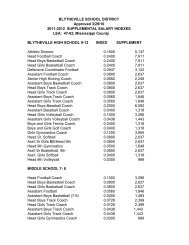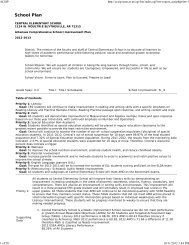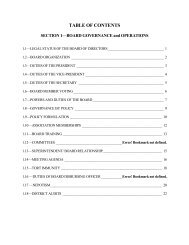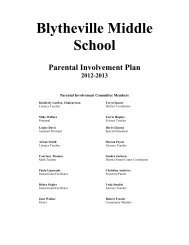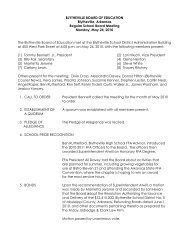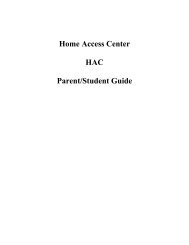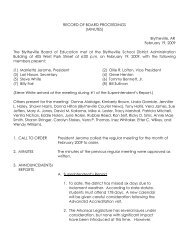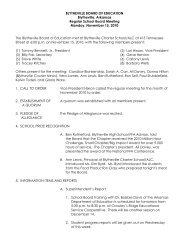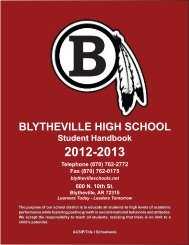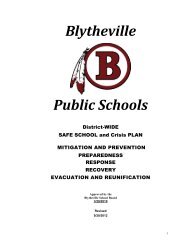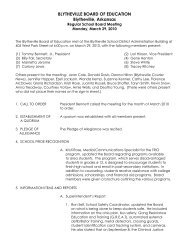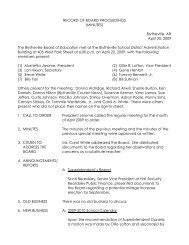Student Handbook - Blytheville Public Schools
Student Handbook - Blytheville Public Schools
Student Handbook - Blytheville Public Schools
You also want an ePaper? Increase the reach of your titles
YUMPU automatically turns print PDFs into web optimized ePapers that Google loves.
will have access to and the responsibility for disclosing information in emergency situations.<br />
When deciding whether to release PII in a health or safety emergency, the District may take into account the totality of the circumstances<br />
pertaining to a threat to the health or safety of a student or other individuals. If the District determines that there is an articulable and significant<br />
threat to the health or safety of a student or other individuals, it may disclose information from education records to any person whose knowledge<br />
of the information is necessary to protect the health or safety of the student or other individuals.<br />
For purposes of this policy, the <strong>Blytheville</strong> School District does not distinguish between a custodial and noncustodial parent, or a non-parent such<br />
as a person acting in loco parentis or a foster parent with respect to gaining access to a student’s records. Unless a court order restricting such<br />
access has been presented to the district to the contrary, the fact of a person’s status as parent or guardian, alone, enables that parent or guardian<br />
to review and copy his child’s records.<br />
If there exists a court order which directs that a parent not have access to a student or his records, the parent, guardian, person acting in loco<br />
parentis, or an agent of the Department of Human Services must present a file-marked copy of such order to the building principal and the<br />
superintendent. The school will make good-faith efforts to act in accordance with such court order, but the failure to do so does not impose legal<br />
liability upon the school. The actual responsibility for enforcement of such court orders rests with the parents or guardians, their attorneys and the<br />
court which issued the order.<br />
A parent or guardian does not have the right to remove any material from a student’s records, but such parent or guardian may challenge the<br />
accuracy of a record. The right to challenge the accuracy of a record does not include the right to dispute a grade, which must be done only<br />
through the appropriate teacher and/or administrator, the decision of whom is final. A challenge to the accuracy of material contained in a student’s<br />
file must be initiated with the building principal, with an appeal available to the Superintendent or his designee. The challenge shall clearly identify<br />
the part of the student’s record the parent wants changed and specify why he/she believes it is inaccurate or misleading. If the school determines<br />
not to amend the record as requested, the school will notify the requesting parent or student of the decision and inform them of their right to a<br />
hearing regarding the request for amending the record. The parent or eligible student will be provided information regarding the hearing procedure<br />
when notified of the right to a hearing.<br />
Unless the parent or guardian of a student (or student, if above the age of eighteen [18]) objects, “directory information” about a student may<br />
be made available to the public, military recruiters, post-secondary educational institutions, prospective employers of those students, as well as<br />
school publications such as annual yearbooks and graduation announcements. “Directory information” includes, but is not limited to, a student’s<br />
name, address, telephone number, electronic mail address, photograph, date and place of birth, dates of attendance, his/her placement on the<br />
honor role (or the receipt of other types of honors), as well as his/her participation in school clubs and extracurricular activities, among others. If<br />
the student participates in inherently public activities (for example, basketball, football, or other interscholastic activities), the publication of such<br />
information will be beyond the control of the District. “Directory information” also includes a student identification (ID) number, user ID, or other<br />
unique personal identifier used by a student for purposes of accessing or communicating in electronic systems and a student ID number or other<br />
unique personal identifier that is displayed on a student’s ID badge, provided the ID cannot be used to gain access to education records except<br />
when used in conjunction with one or more factors that authenticate the user’s identity, such as a personal identification number (PIN), password<br />
or other factor known or possessed only by the authorized user,<br />
A student’s name and photograph will only be displayed on the district or school’s web page(s) after receiving the written permission from the<br />
student’s parent or student if over the age of 18.<br />
The form for objecting to making directory information available is located in the back of the student handbook and must be completed and signed<br />
by the parent or age-eligible student and filed with the building principal’s office no later than ten (10) school days after the beginning of each<br />
school year or the date the student is<br />
enrolled for school. Failure to file an objection by that time is considered a specific grant of permission. The district is required to continue to honor<br />
any signed-opt out form for any student no longer in attendance at the district.<br />
The right to opt out of the disclosure of directory information under FERPA does not prevent the District from disclosing or requiring a student to<br />
disclose the student’s name, identifier, or institutional email address in a class in which the student is enrolled.<br />
Parents and students over the age of 18 who believe the district has failed to comply with the requirements for the lawful release of student<br />
records may file a complaint with the U.S. Department of Education at<br />
Family Policy Compliance Office<br />
U.S. Department of Education<br />
400 Maryland Avenue, SW<br />
Washington, DC 20202<br />
Date Adopted: 02/23/04 Last Revised: 04/23/12<br />
4.14—STUDENT PUBLICATIONS AND THE DISTRIBUTION OF LITERATURE<br />
<strong>Student</strong> <strong>Public</strong>ations<br />
All publications that are supported financially by the school or by use of school facilities, or are produced in conjunction with a class shall be<br />
considered school-sponsored publications. School publications do not provide a forum for public expression. Such publications, as well as the<br />
content of student expression in school-sponsored activities, shall be subject to the editorial control of the District’s administration whose actions<br />
shall be reasonably related to legitimate pedagogical concerns and adhere to the following limitations.<br />
1. Advertising may be accepted for publications that does not condone or promote products that are inappropriate for the age and maturity of<br />
9



